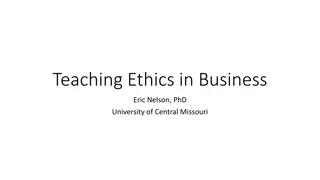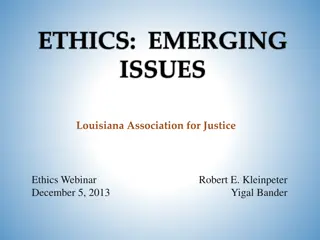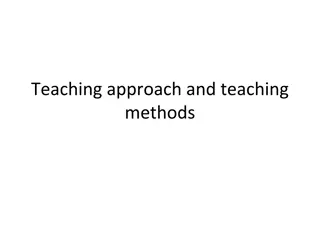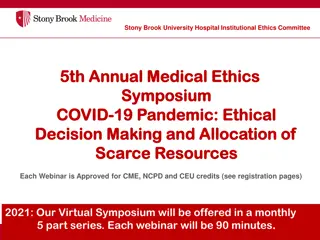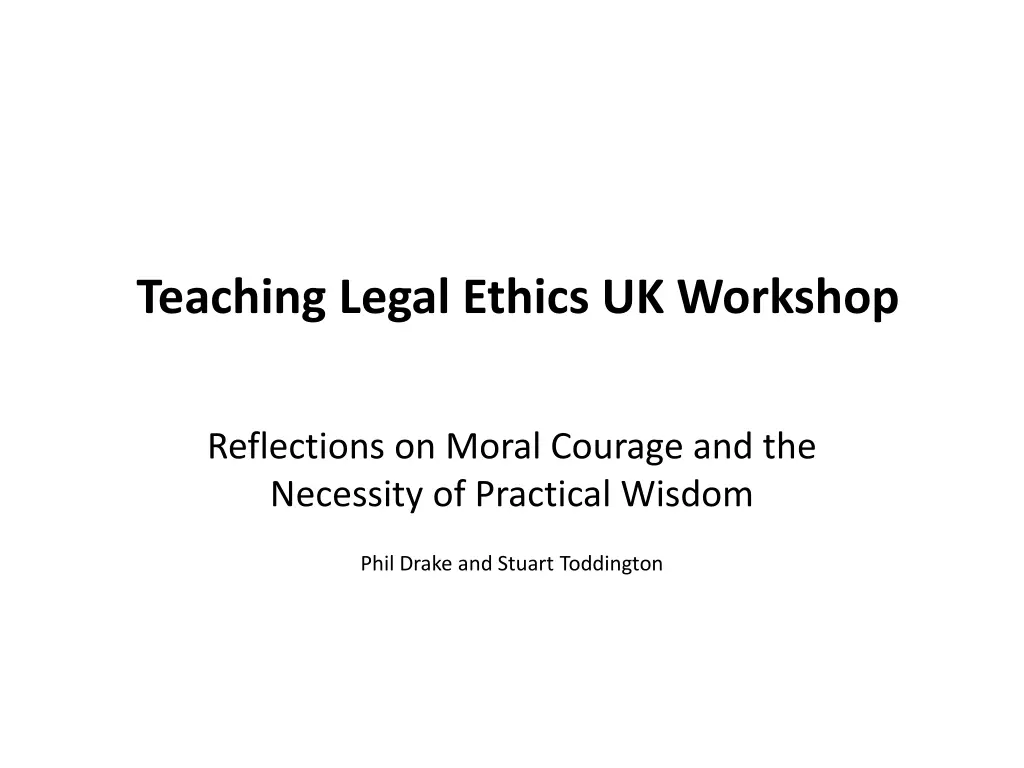
Reflections on Legal Ethics Workshop: Moral Courage & Practical Wisdom
Explore the complexities of legal ethics through moral courage and practical wisdom in the UK workshop led by Phil Drake and Stuart Toddington. Delve into ethical dilemmas, teaching practical wisdom, and navigating the intricacies of legal practice with insightful reflections and thought-provoking discussions.
Uploaded on | 0 Views
Download Presentation

Please find below an Image/Link to download the presentation.
The content on the website is provided AS IS for your information and personal use only. It may not be sold, licensed, or shared on other websites without obtaining consent from the author. If you encounter any issues during the download, it is possible that the publisher has removed the file from their server.
You are allowed to download the files provided on this website for personal or commercial use, subject to the condition that they are used lawfully. All files are the property of their respective owners.
The content on the website is provided AS IS for your information and personal use only. It may not be sold, licensed, or shared on other websites without obtaining consent from the author.
E N D
Presentation Transcript
Teaching Legal Ethics UK Workshop Reflections on Moral Courage and the Necessity of Practical Wisdom Phil Drake and Stuart Toddington
Teaching Legal Ethics UK Workshop Reflections on Moral Courage and the Necessity of Practical Wisdom Phil Drake and Stuart Toddington
Teaching Practical Wisdom Should we teach Practical Wisdom? How do we teach Practical Wisdom?
Ethical Dilemma 1 Your client wants compensation for a disease picked up at work you require further information about the disease but can only get it from the defendant. Should you pretend to be a student researching this disease to get the information? (many thanks to Professor Donald Nicolson of the University of Strathclyde for providing this dilemma). 1. What is your decision? 2. Why? 3. What method did you use to arrive at this decision?
Some of our ideas for teaching Practical Wisdom Facilitated Learning and Vygotsky s Zone of Proximal Development. Three Models of Skill Integration Automatically integrated model; Problematically integrated model; and Unintegrated model. Leads us to consider The Matrix of Concerns . (a) the interests of the client; (b) the requirements of relevant legislation; (c) the requirements of the professional ethical code (d) the orthodoxly accepted set of clerical, technical and administrative skills expected of practising lawyers; and (e) the underlying social or moral purpose of the legislation. Identifying ethical goals and means to achieve these goals.
Ethical Dilemma 2 You are acting against a law firm who has made one of their trainees redundant while on maternity leave. She informs you in passing that a fellow worker had been subject to sexual harassment by the partner responsible, but does not suggest that you use this information. Should you go ahead and use this information as a bargaining tool or should you clear this with your client first? (many thanks to Professor Donald Nicolson of the University of Strathclyde for providing this dilemma). 1. What is your decision? 2. Why? 3. What method did you use to arrive at this decision?
Teaching Legal Ethics UK Workshop Reflections on Moral Courage and the Necessity of Practical Wisdom Phil Drake and Stuart Toddington
Teaching Practical Wisdom Should we teach Practical Wisdom? How do we teach Practical Wisdom?
Ethical Dilemma 1 Your client wants compensation for a disease picked up at work you require further information about the disease but can only get it from the defendant. Should you pretend to be a student researching this disease to get the information? (many thanks to Professor Donald Nicolson of the University of Strathclyde for providing this dilemma). 1. What is your decision? 2. Why? 3. What method did you use to arrive at this decision?
Some of our ideas for teaching Practical Wisdom Facilitated Learning and Vygotsky s Zone of Proximal Development. Three Models of Skill Integration Automatically integrated model; Problematically integrated model; and Unintegrated model. Leads us to consider The Matrix of Concerns . (a) the interests of the client; (b) the requirements of relevant legislation; (c) the requirements of the professional ethical code (d) the orthodoxly accepted set of clerical, technical and administrative skills expected of practising lawyers; and (e) the underlying social or moral purpose of the legislation. Identifying ethical goals and means to achieve these goals.
Ethical Dilemma 2 You are acting against a law firm who has made one of their trainees redundant while on maternity leave. She informs you in passing that a fellow worker had been subject to sexual harassment by the partner responsible, but does not suggest that you use this information. Should you go ahead and use this information as a bargaining tool or should you clear this with your client first? (many thanks to Professor Donald Nicolson of the University of Strathclyde for providing this dilemma). 1. What is your decision? 2. Why? 3. What method did you use to arrive at this decision?
Teaching Practical Wisdom Should we teach Practical Wisdom? How do we teach Practical Wisdom?
Ethical Dilemma 1 Your client wants compensation for a disease picked up at work you require further information about the disease but can only get it from the defendant. Should you pretend to be a student researching this disease to get the information? (many thanks to Professor Donald Nicolson of the University of Strathclyde for providing this dilemma). 1. What is your decision? 2. Why? 3. What method did you use to arrive at this decision?
Some of our ideas for teaching Practical Wisdom Facilitated Learning and Vygotsky s Zone of Proximal Development. Three Models of Skill Integration Automatically integrated model; Problematically integrated model; and Unintegrated model. Leads us to consider The Matrix of Concerns . (a) the interests of the client; (b) the requirements of relevant legislation; (c) the requirements of the professional ethical code (d) the orthodoxly accepted set of clerical, technical and administrative skills expected of practising lawyers; and (e) the underlying social or moral purpose of the legislation. Identifying ethical goals and means to achieve these goals.
Ethical Dilemma 2 You are acting against a law firm who has made one of their trainees redundant while on maternity leave. She informs you in passing that a fellow worker had been subject to sexual harassment by the partner responsible, but does not suggest that you use this information. Should you go ahead and use this information as a bargaining tool or should you clear this with your client first? (many thanks to Professor Donald Nicolson of the University of Strathclyde for providing this dilemma). 1. What is your decision? 2. Why? 3. What method did you use to arrive at this decision?















